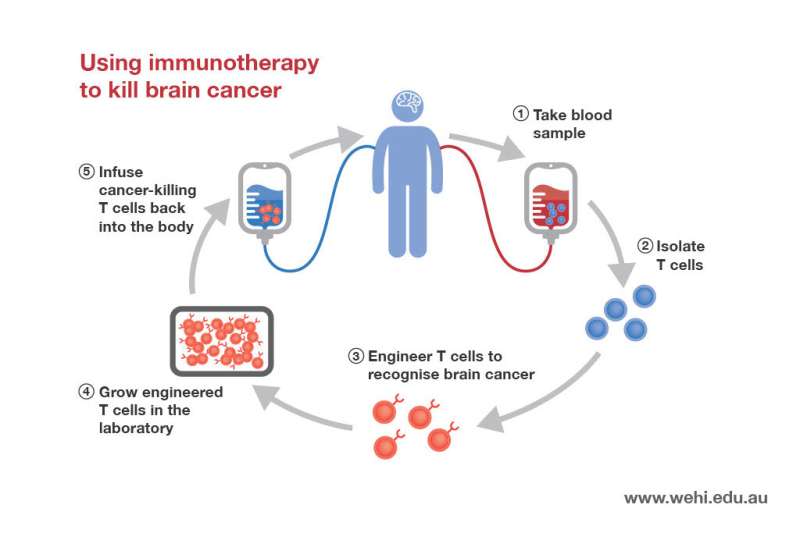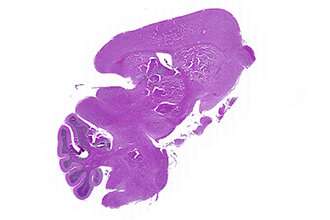This article has been reviewed according to Science X's editorial process and policies. Editors have highlighted the following attributes while ensuring the content's credibility:
fact-checked
trusted source
proofread
Advanced immunotherapy treatment may hold promise for children with brain cancer

Usually occurring in children aged 5 to 7 years old, Diffuse Intrinsic Pontine Glioma (DIPG) is an aggressive type of brain tumor that affects 20 children in Australia each year.
The fast-growing tumor forms in the part of a child's brain responsible for vital functions like breathing, swallowing and movement, meaning it is unable to be surgically removed.
Children diagnosed with DIPG are unlikely to survive a year beyond diagnosis and there is currently no treatment for this devastating condition.
CAR T therapy has anti-cancer effect on DIPG
WEHI researchers have found promise in treating DIPG with an innovative new immunotherapy treatment, called CAR T therapy.
Published in Neuro-Oncology Advances, the research showed CAR T therapy was effective at targeting DIPG tumors.
CAR T cell therapy involves isolating a patient's immune cells, engineering them to become "super killer cells" and then re-infusing them into the patient to fight their cancer.
The research, led by Associate Professor Misty Jenkins, Laboratory Head at WEHI and The Brain Cancer Center, showed in preclinical models these specifically-engineered CAR T cells were able to enter the brain and have an anti-cancer effect by reducing the tumor burden.
"Unlike radiation, which is a blunt instrument that kills cancerous as well as healthy brain tissue, CAR T cell therapy uses a patient's own immune cells and engineers them to recognize and kill the tumor," she said.
"CAR T cells offer a possibility of cure, with no long-term side-effects.
"These genetically-modified white blood cells act as a 'living drug,' which means the patient will retain a living memory in their body of the anti-tumor response that may also work to kill the tumor again if it ever returns.
"The way these cells can completely eliminate the tumors and persist in the body into the future is what is so exciting about CAR T cell therapy, and why immunotherapy is the future of precision medicine."

New target for future clinical trials
The study found DIPG brain tumors can be targeted using CAR T cells that recognize a cancer-specific protein called HER2. Once in the brain, the CAR T cells recognized this protein and signaled the T cells to kill the tumor cells.
Associate Professor Jenkins said the use of CAR T cell therapy had effectively eliminated the DIPG tumors in the study's preclinical models.
"This paper shows that an approach to HER2 does work, and we hope to see this treatment incorporated into current and future clinical trials available to children in Australia," she said.
"While there are no long-term studies yet, this research builds on other work that has shown this treatment to be effective in reducing DIPG tumors and improving the quality of life for these patients, who currently have no treatment options.
"Our hope is that this treatment will be included in future clinical trials and will eventually be used in combination with other drugs to treat DIPG."
Laying the groundwork for new therapies
The research was a promising step forward in treating DIPG, Associate Professor Jenkins said.
"This lays the groundwork for us to interrogate thousands of potential therapies for anti-cancer immune cells to fight DIPG," she said.
"Other studies have demonstrated this treatment approach is safe in children, so we are hopeful it won't be long before it is clinically available."
More information: Stacie S Wang et al, HER2 chimeric antigen receptor T cell immunotherapy is an effective treatment for diffuse intrinsic pontine glioma, Neuro-Oncology Advances (2023). DOI: 10.1093/noajnl/vdad024





















